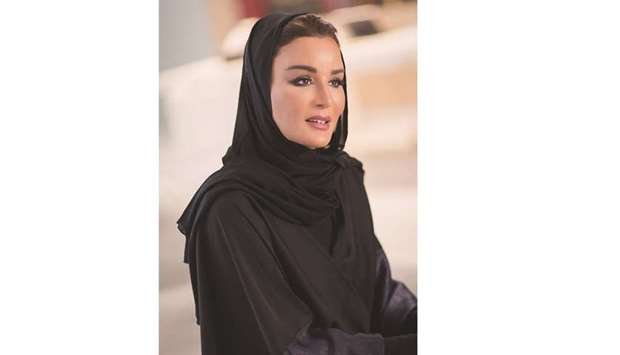Her Highness Sheikha Moza bint Nasser, Chairperson of Education Above All Foundation (EAA) and UN Sustainable Development Goals Advocate, on Thursday called for cross-sector collaboration to ensure equity in digital learning for children across the globe, especially those marginalised.
Speaking at an extraordinary session on Education Post-Covid-19 of the Global Education Meeting (2020 GEM), co-hosted by the governments of Ghana, Norway, the United Kingdom and Unesco, HH Sheikha Moza highlighted the central necessity of digital connectivity in education to counter the unjust digital divide.
"We must rise to the challenge and democratise digital learning, humanise technology and customise curriculum. We must unite across different sectors to make digital learning an inclusive right for the most marginalised children and youth across the globe," she said.
"We also cannot return to the traditional mode of education, measured by the quantity of knowledge 'deposited' into the minds of students. We need to develop technologies that support personalised learning, so learners can proceed at their own pace and educators can adapt to learners' specific needs and circumstances, without disruption."
Sheikha Moza also noted that Covid-19 has shown how creative the human mind can be when it is faced with existential challenges that are inspiring education solutions across the globe, and called on companies to invest in these ideas.
"I ask tech companies to step up and contribute to closing the digital gap by directing their efforts to scale up these innovative, grassroots solutions. Collaboration across sectors and innovation is the only way forward. Let us seize this moment to build a new future - a future that leaves no one without access to digital learning behind."
The high-level event featured speeches from Ghana's President Nana Akufo-Addo, United Nations Secretary General Antonio Guterres, Norwegian Prime Minister Erna Solberg, Unesco Director-General Audrey Azoulay, UK Minister for Foreign Affairs and Development Baroness Sugg, Unesco Assistant Director-General for Education Stefania Giannini, and UN Secretary-General's Envoy on Youth Jayathma Wickramanayake among others.
In response to the unprecedented global social and economic crisis caused by the Covid-19 pandemic, the session brought together the expertise of the UN system and education partners to agree on a set of global priority actions to be put in place by the end of 2021 for the recovery and strengthening of education systems worldwide.
In fact, recent studies show an alarming magnitude of Covid-19 impact on education budgets as well as strong evidence that early and sustained investment in education will reduce long-term costs for achieving Sustainable Development Goal (SDG) 4 on education and increase both social and private returns to achieving other SDGs.
GEM is a unique platform for exchange among high-level political leaders, policy-makers and global education actors to protect and rethink education in the current and post-Covid-19 world and agree on global priority actions for educational recovery and progress in the Decade of Action for Sustainable Development.
The high-level commitment meeting further adopted the 2020 GEM Declaration, drawing commitments for the fulfilment of the global action points at the country level from Representatives of Member States, the SDG-Education 2030 Steering Committee, the Collective Consultation of NGOs on Education 2030 (CCNGO), multilateral organisations and regional organisations, as well as other key stakeholders.
"We must rise to the challenge and democratise digital learning, humanise technology and customise curriculum. We must unite across different sectors to make digital learning an inclusive right for the most marginalised children and youth across the globe," she said.
"We also cannot return to the traditional mode of education, measured by the quantity of knowledge 'deposited' into the minds of students. We need to develop technologies that support personalised learning, so learners can proceed at their own pace and educators can adapt to learners' specific needs and circumstances, without disruption."
Sheikha Moza also noted that Covid-19 has shown how creative the human mind can be when it is faced with existential challenges that are inspiring education solutions across the globe, and called on companies to invest in these ideas.
"I ask tech companies to step up and contribute to closing the digital gap by directing their efforts to scale up these innovative, grassroots solutions. Collaboration across sectors and innovation is the only way forward. Let us seize this moment to build a new future - a future that leaves no one without access to digital learning behind."
The high-level event featured speeches from Ghana's President Nana Akufo-Addo, United Nations Secretary General Antonio Guterres, Norwegian Prime Minister Erna Solberg, Unesco Director-General Audrey Azoulay, UK Minister for Foreign Affairs and Development Baroness Sugg, Unesco Assistant Director-General for Education Stefania Giannini, and UN Secretary-General's Envoy on Youth Jayathma Wickramanayake among others.
In response to the unprecedented global social and economic crisis caused by the Covid-19 pandemic, the session brought together the expertise of the UN system and education partners to agree on a set of global priority actions to be put in place by the end of 2021 for the recovery and strengthening of education systems worldwide.
In fact, recent studies show an alarming magnitude of Covid-19 impact on education budgets as well as strong evidence that early and sustained investment in education will reduce long-term costs for achieving Sustainable Development Goal (SDG) 4 on education and increase both social and private returns to achieving other SDGs.
GEM is a unique platform for exchange among high-level political leaders, policy-makers and global education actors to protect and rethink education in the current and post-Covid-19 world and agree on global priority actions for educational recovery and progress in the Decade of Action for Sustainable Development.
The high-level commitment meeting further adopted the 2020 GEM Declaration, drawing commitments for the fulfilment of the global action points at the country level from Representatives of Member States, the SDG-Education 2030 Steering Committee, the Collective Consultation of NGOs on Education 2030 (CCNGO), multilateral organisations and regional organisations, as well as other key stakeholders.

